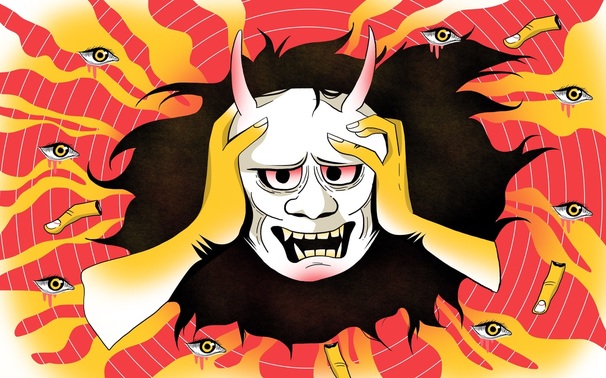|
The paradox of living in a traditional high-density Japanese neighborhood is that on some days it feels like there is no-one living here at all. Granted, summer has begun and the heat and humidity are oppressive, which means the narrow crooked streets of the Good Hood are quiet, save for the happy hum of Toshiba air-conditioners and the sound of a far-off water gun battle. But when the sun sets, the neighborhood broadcasts a new symphony. I can’t say if this is the true nocturne of night-time across Japan because I’ve lived on the same street for 18 years but I suspect so, only probably louder in Osaka. Let me describe the aural clock I live by: sunset brings the sound of bicycle bells and screaming brakes as workers pass through my neighborhood on their way home to the burbs; then comes the soft-shoe shuffle of my elderly neighbors carrying their garbage bags to the collection point outside my house. Later, the tom cats will tear these open and fight each other for the fish bones, hissing and screaming, and maybe leave a little surprise on my doorstep. Thankfully the singing drunks who come after will scare them away before those surprises pile up. These singing drunks are mostly businessmen, sometimes on ‘requisitioned’ bicycles, whose hard-earned cash is sometimes also ‘requisitioned’ by the ladies on Salt Town Street. But that’s another story. Around midnight the security guard who lives to the north of me arrives home. I know exactly when he arrives because his dog, “Pudding”, announces it. On summer nights when the air is still and hot, I lie awake on my futon and listen to the off-duty security guard climb the wooden staircase to his balcony where he proceeds to tear the tabs of a half-dozen cans of beer. I also hear the clickety-clicking of his empty cigarette lighter and the crackle of saltpeter as 4,000 chemicals burn between his fingers. On Sunday mornings he plays Harry Belafonte up loud, and now I ask you, how would you like to awaken to “The Banana Boat Song" ("Day-O”) or some other Caribbean drinking ditty at seven in the morning of your only day off? But back to the clock. We are at midnight. This is when the junk mailman’s farting Suzuki rolls into town and the sound of him jockeying this pile of nuts and bolts through the alleyways, stuffing letter boxes full of ads for private detectives (the wives have heard of Salt Town Street), summer futons and cheap haircuts, deprives me of another ten minutes sleep. Yes, there are nights when I envy the hard-of-hearing, these old-timers who can drop their blinds at eight-thirty and rise with the sun to water their morning glories with eight hours of uninterrupted sleep in between. Three months ago, new neighbors moved in. Like rust, they don’t sleep either. Rust doesn’t sleep because science says so. These people are very unscientific. They might even be from Tokyo - the city of a million and one insomniacs - but I give them the benefit of the doubt and say that it takes time to acclimatise to new surroundings. So I will endure the teenage daughter who sings Japanese anime songs at one in the morning from her upstairs window, and the father who stays out late and returns to a berating from his wife whose late-night TV drama he’s interrupting, and finally the hot water shower system which sounds like a high-octane dragster splitting the dead of night wide open. Thankfully my new neighbours don’t have a dog named Pudding. They have turtles, and like all turtles they started out small (at a ‘catch-em-yourself’ festival street stall). Now they have grown so big that the family last week told me they are going to build a concrete enclosure and sink a well in the backyard to give their pets fresh water for life. It costs ¥500 ($4.80) to play the festival turtles. It will cost my neighbors another ¥500,000 ($4,800) to house them. I like turtles. Turtles don’t complain about the heat, they keep regular hours, and they don’t sing or smoke. They just live long SILENT lives.
2 Comments
Saw my old friend Smokin Joe Matsumoto the other day after a winter’s hiatus. Like the old bear he is, the scent of a Japanese spring had teased him from his lair and back to his plot of earth beside our waterway, the Semba River. I’m guessing those endless tempura lunches and hot pot dinners all through the long cold months had expended his supply of homegrown vegetables and there was nothing for it but to go break the soil for a new planting.
For the record, Smokin Joe is not only a damn good cook, he is a man of indeterminable age and boundless wisdom, AND he has a right arm that could kill a watermelon thief with an eggplant at 50 paces. Like the grasshopper in the Aesop’s fable, he is also a prodigious and pragmatic food producer—a ‘celery man’ in a nation of ‘salarymen’—working for his garden, not a company, reaping the bounty for himself, not his boss. Now spring has passed and the warmer temperatures mix with rain to unleash green fury on our neighborhood. Not so long ago I awoke to cherry blossoms outside my window; now it’s Day of the Triffids; creeper, weeds and bamboo swallow the old and derelict houses and will do so until distant relatives of their deceased (or institutionalised) owners can fight back with hand saws and weed cutters. This does not bother the tadpoles—there will always be broken flower pots and abandoned bathtubs filled with rainwater for swimming lessons. After, the paddy snakes will decide the quick and dead. Early evening when the western sky is still bright enough to see by and the bats are skirting and diving over the Semba River is when the kitchen gardeners are most active. Up and down the river they muddle about in their small plots of land, tossing buckets attached to ropes into the current to top up their bathtub water tanks for the long, hot days ahead, then maybe puff thoughtfully on a cigarette, like my mate Smokin Joe, or put a sly beer down the hatch before bundling their bounty onto a bicycle and peddling home to more beer and baseball on TV. These constant gardeners are the last hold-outs in the war against the Machines, the construction companies and their excavators, and the real estate agents so keen to turn productive earth into pavement-for-profit—parking lots, that is. Last year Smokin Joe was robbed by watermelon thieves. They came in the night and rolled off his best. Another day he noticed soil missing and filed a report with police. The cops call in occasionally to say they’re “still working on it” and together Smokin and I try to imagine the headlines when they solve this big one: “Soil Gang Foiled” or “Cops Hit Pay Dirt” or “Quiet Earth Found.” When the harvesting begins, the bounty reaches everyone. My neighbours, the affable Funabiki barbers, brought me a string of giant onions yesterday and last week a bag of eggplant and capsicums was left swinging from my door by an anonymous friend. Sometimes the old woman who feeds the grey heron on the Semba also feeds me—with a great dirty daikon from her veggie patch. Smokin Joe, by his very nature, is a generous man, proffering bags and baskets of vegetables as the seasons progress: strawberries in May, capsicum and broad beans in June, sweet peas and cherry tomatoes in July, corn in August and the culinary calendar rolls on until December arrives and Smokin goes into hibernation with a crate of sake and enough cooking oil to see him through the winter. In the meantime I look forward to June. June means cucumber: cucumber for breakfast, cucumber for lunch, cucumber for dinner. There’s nothing like a chilled cucumber with salted kelp served with a bottle of Kirin lager at the end of a hot June day. Smokin Joe would agree. |
This Blog:What is the essence of a traditional Japanese neighbourhood? Writing from my home in Himeji, a castle town in western Honshu, Seaweed Salad Days distills, ferments, presents! Archives
March 2024
Categories
All
|


 RSS Feed
RSS Feed
